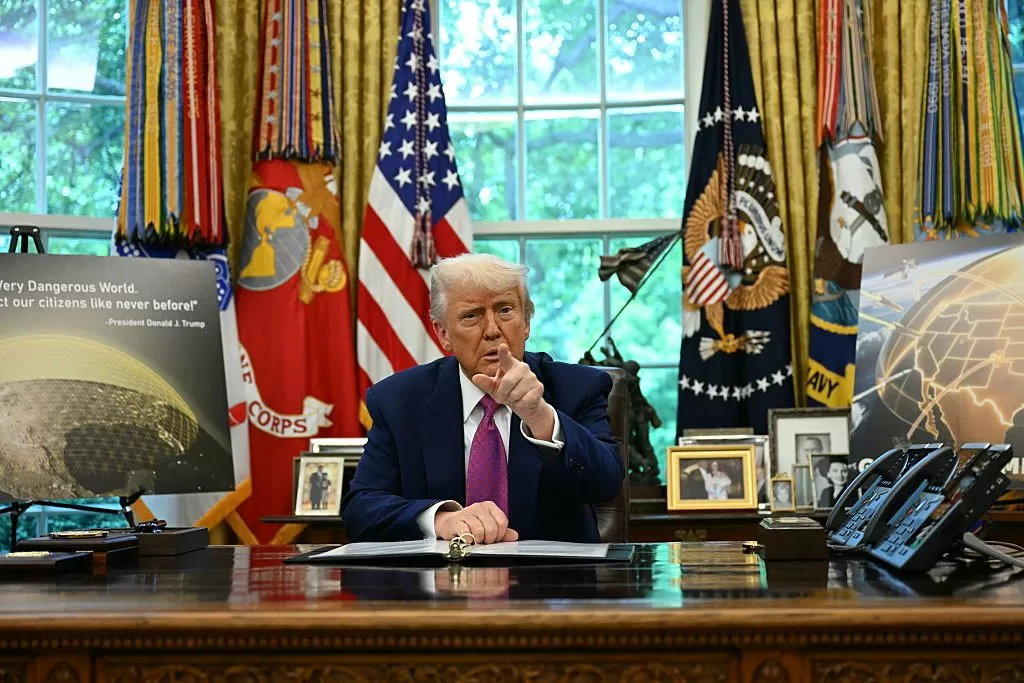In a surprising move, U.S. President Donald Trump has offered Canada the opportunity to join the U.S. missile-defense system for free, on one condition – that Canada becomes the 51st state of the United States. This offer has sparked a lot of debate and speculation, with some seeing it as a strategic move by the U.S. and others viewing it as a potential game-changer for Canada. But what does this offer really mean for Canada and its relationship with its southern neighbor?
Firstly, let’s take a closer look at the offer itself. President Trump has proposed that Canada join the U.S. missile-defense system, which is designed to protect the U.S. and its allies from potential missile attacks. This system has been a point of contention between the U.S. and Canada for years, with Canada previously declining to participate due to concerns about sovereignty and the cost of joining. However, with this new offer, Canada would not only have the opportunity to join the system for free, but also become a part of the U.S. as its 51st state.
This offer has been met with mixed reactions in Canada. Some see it as a way to strengthen the country’s defense capabilities and improve its relationship with the U.S. Others, however, are concerned about the potential loss of sovereignty and the impact on Canadian identity. But before we jump to any conclusions, let’s examine the potential benefits and drawbacks of this offer.
On the positive side, joining the U.S. missile-defense system would provide Canada with an added layer of protection against potential threats. As a part of the U.S., Canada would have access to advanced technology and resources that would greatly enhance its defense capabilities. This could also lead to increased cooperation and coordination between the two countries in terms of defense and security, which could ultimately benefit both nations.
Moreover, becoming the 51st state of the U.S. would also bring economic benefits to Canada. As a state, Canada would have access to the U.S. market and its vast resources, which could boost trade and create new opportunities for Canadian businesses. This could also lead to increased investment in Canada, creating jobs and boosting the economy.
However, there are also concerns about the potential drawbacks of this offer. One of the main concerns is the loss of sovereignty and the impact on Canadian identity. Becoming a state of the U.S. would mean giving up some of Canada’s autonomy and potentially adopting American policies and values. This could have a significant impact on Canadian culture and identity, which is something that many Canadians hold dear.
There are also concerns about the potential political implications of this offer. Some fear that becoming a state of the U.S. could mean losing Canada’s voice on the international stage and being overshadowed by its larger neighbor. This could also lead to a shift in Canada’s foreign policy and potentially strain relationships with other countries.
So, what does this offer mean for Canada and its relationship with the U.S.? It is clear that there are both potential benefits and drawbacks to this proposal. Ultimately, the decision to join the U.S. missile-defense system and become a state lies in the hands of the Canadian government and its citizens. It is a decision that should not be taken lightly and requires careful consideration of all the potential implications.
In the end, this offer by President Trump has sparked an important conversation about the relationship between Canada and the U.S. and the role of defense and security in that relationship. It is a reminder that as neighbors and allies, the two countries must continue to work together and find ways to strengthen their partnership for the benefit of both nations.
In conclusion, while the offer to join the U.S. missile-defense system for free in exchange for becoming the 51st state may seem like a tempting opportunity, it is important for Canada to carefully weigh the potential benefits and drawbacks before making a decision. Whatever the outcome may be, one thing is certain – the relationship between Canada and the U.S. will continue to evolve and shape the future of both nations.



